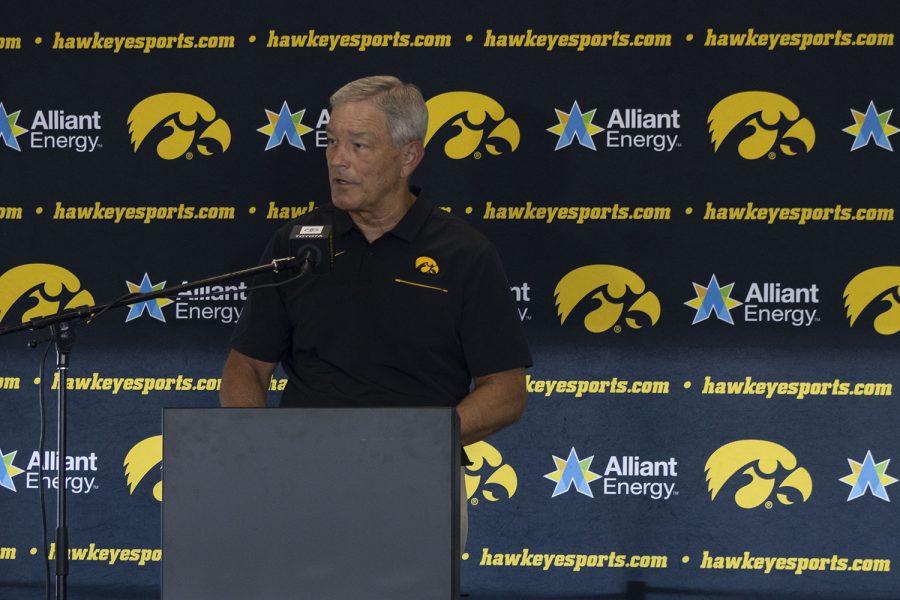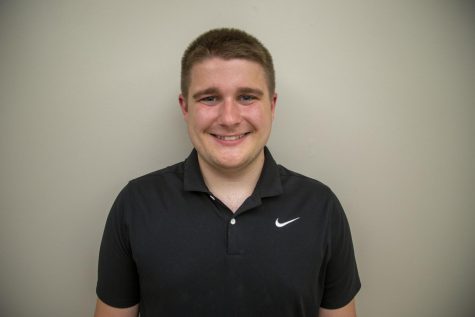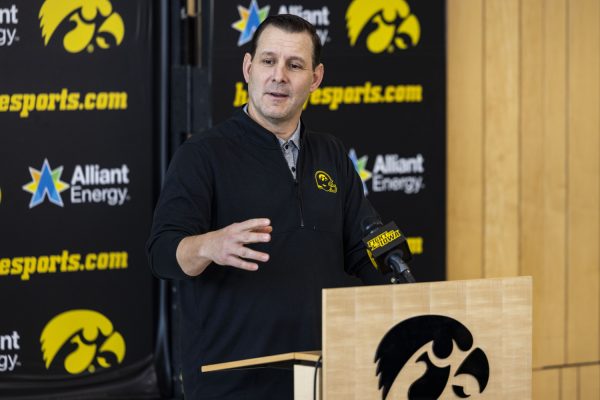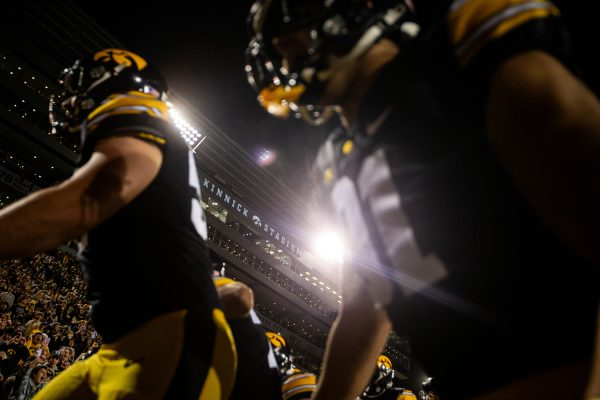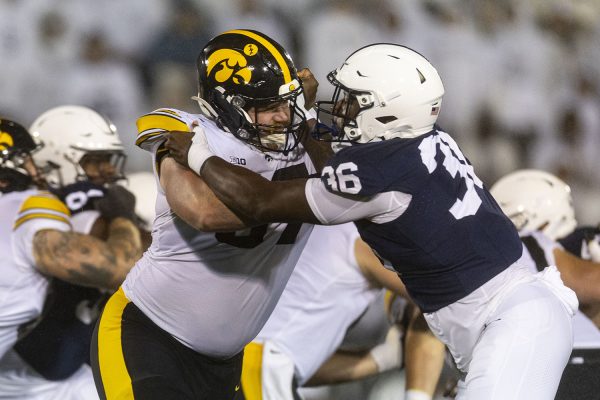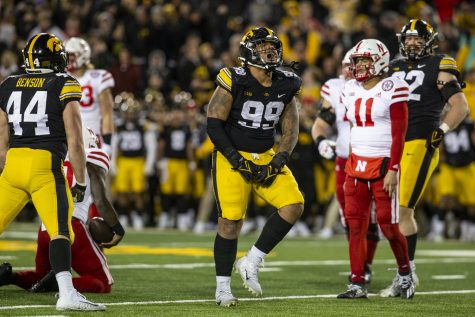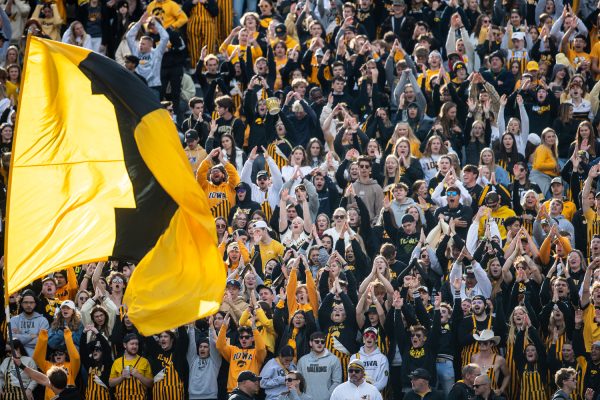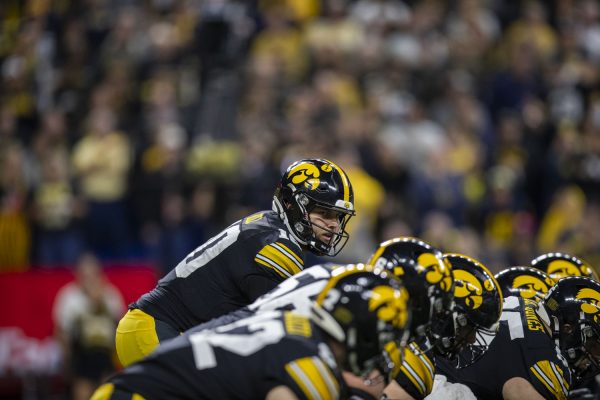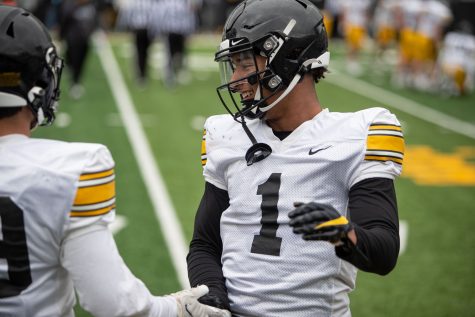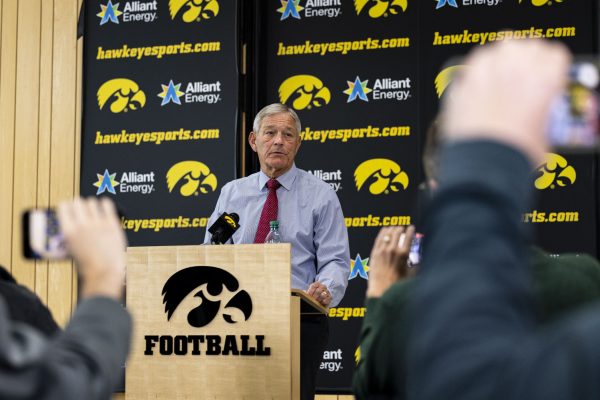Review of Iowa football program states program’s rules ‘perpetuated racial or cultural biases’
The Kansas City law firm Husch Blackwell does not recommend that Athletic Director Gary Barta or head football coach Kirk Ferentz be removed based on the investigation’s findings.
Iowa head coach Kirk Ferentz speaks at a press conference on Thursday, July 16, 2020 at the Pacha Family Club Room in Kinnick Stadium. Ferentz discussed the upcoming football season and the continuing actions that the team is working on toward strengthening inclusivity in the program. (Hannah Kinson/ The Daily Iowan)
July 30, 2020
A review of the Iowa football program by the Kansas City law firm Husch Blackwell found that the program’s rules “perpetuated racial or cultural biases and diminished the value of cultural diversity,” and that the program over-monitored players to the point that they experienced heightened anxiety and maintained a culture that allowed a “small group of coaches” to demean players.
Iowa Athletic Director Gary Barta announced June 15 that the University of Iowa had hired Husch Blackwell to review the allegations of racism and bullying made against the football program. The review has been completed nearly seven weeks later.
Husch Blackwell interviewed 111 individuals as part of its investigation, including 45 current and 29 former members of the football team and 36 current and former employees. The law firm reported its findings directly to UI President Bruce Harreld. An Iowa Board of Regents meeting was held Wednesday, but the report was not discussed.
“I have read the report, and it is clear that the climate and culture must and will change within our football program,” Harreld said in a release. “Our student-athletes must have the ability to be true to themselves, and we cannot and will not tolerate a systemic process that inhibits authenticity.”
The 26-page report of the law firm’s findings was released Thursday morning. The full report can be read here.
In addition to the report, Husch Blackwell provided the UI with four personnel reports related to current and former employees that will be a part of those individuals’ confidential personnel records.
According to the report, current and former players were overwhelmingly positive in their evaluation of the coaching staff, with three exceptions. Many current and former players told investigators that three members of the coaching staff abused their power and verbally abused and bullied players. Specific allegations about current and former employees have been provided separately to the university.
“We have identified the issues, we have and will continue to address personnel matters, and we have started and will continue the needed change in our football program,” Harreld said in a release.
In its conclusion, the report does not recommend that Barta or head coach Kirk Ferentz be removed over the findings of the investigation.
“Both the Athletic Director and Head Coach Ferentz expressed their commitment to rebuild trust with players and foster an environment that embodies the Department’s values of diversity, equity and inclusion,” the report states. “We recommend that the University work with Athletic Director Barta and Head Coach Ferentz to create action steps aimed at improving the culture of the program, eliminating biases, encouraging student-athletes to report concerns of mistreatment, and amplifying the University’s policy statement against retaliation within the football program.”
Following the release of the report, Ferentz issued a public statement.
“This is an important time for me as a leader and for our program,” Ferentz said in a statement released on Twitter. “The Review brings us face-to-face with allegations of uneven treatment, where our culture that mandated uniformity caused many black players to feel they were unable to show up as their authentic selves. I want to apologize for the pain and frustration they felt at a time when I was trusted to help each of them become a better player, and a better person.
“There were several key take-aways that influence how we will advance the program, so every student-athlete has a healthy and positive team experience. This has been a moment of truth for me. The release of this independent review is not the end of the conversation, it is the beginning of the next chapter in our program’s history.”
The review of the program began in June after Black former players began to speak out against the program and its treatment of Black players. Former Iowa offensive lineman James Daniels tweeted on June 5 that “There are too many racial disparities in the Iowa football program,” and that “Black players have been treated unfairly for far too long.”
Former strength and conditioning coach Chris Doyle was mentioned specifically by several former players in their allegations. Doyle was placed on administrative leave June 6. On June 15, the athletics department announced that the UI and Doyle had agreed to a $1.1 million separation agreement.
In the report, one former player said that the program’s culture was one where it is acceptable to demean people based on disability or race. Several former players who were interviewed said that this was “not just a Chris Doyle problem.”
“Those players said the culture problems are systemic and cannot be fixed simply by getting rid of one coach,” the report states. “Several former players commented that Coach Doyle should not be a ‘scapegoat’ for the systemic issues in the program.”
Other findings in the report include:
- Players and coaches agree that the Iowa football program is based on discipline and accountability.
- “Several current and former players shared the view that some coaches have used those values to create and perpetuate an environment that bullies and demeans athletes, especially Black athletes,” the report states. “Moreover, recognizing that college athletes typically experience some degree of stress associated with their training and performance, several interviewees shared that the program’s stringent rules promulgated under the name of discipline place significant, heightened stress on players of all races.”
- The programs philosophy of “The Iowa Way” mandates uniformity and discourages individualism.
- “Many Black players expressed difficulty adjusting to the program’s culture as a result, explaining that they were required to conform to a ‘mold’ that appeared to be built around the stereotype of a clean-cut, white athlete from a midwestern background,” the report states. “Numerous rules, both formal and perceived, requiring conformity around hair, clothing, jewelry, and tattoos left many Black players feeling isolated, targeted, and unwelcome in the program.”
- Ferentz received generally positive reviews from the players interviewed.
- “While many players shared criticisms about the program generally or their personal experiences with certain coaches, most players commented positively about Head Coach Kirk Ferentz and his leadership of the program,” the report states. “Numerous players also praised their position coaches and described the beneficial impact those coaches have had on both their athletic and personal development. Players of all races also described forming good relationships with their teammates.”
- The program’s culture has improved since former players started to speak out.
- “Current players were uniform in their belief that the environment in the football program has improved significantly since the inception of this review — both in a general sense and through specific attempts to address or prevent racial inequities,” the report states. “The players expressed hopefulness that these improvements will continue and result in sustained action that will improve the program.”
In its conclusion, the report states that current players are “cautiously optimistic” that the coaching staff is listening to their concerns and having genuine conversations with them.
As first reported by the Cedar Rapids Gazette, the law firm’s contract with the UI says payment amounts for attorneys on this investigation range from $240 to $675 per hour for partners and $200 to $390 per hour for senior counsel and associates.
Payments to Husch Blackwell will come from the Athletic Department budget.
Barta and Ferentz will speak at a press conference at 1 p.m. Thursday.
This is a developing story. Follow The Daily Iowan for updates.



